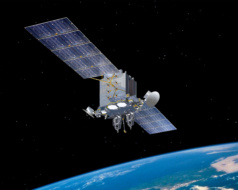How could the US respond to an adversary such as Russia or China nuclearizing space? The Lieber Institute at West Point released a plan on Friday sharing potential responses for a hypothetical that no one ever wants to become reality.
In the paper, Maj. Brian Green, the chief of space and operations law for Space Training and Readiness Command, laid out the legal and geopolitical options available to the US government to stem the proliferation of nuclear weapons and other WMDs in orbit.
Soft-power: While governments have long been placing military and surveillance sats in orbit, the Outer Space Treaty of 1967 specifically bans putting nuclear weapons and WMDs in orbit. However, without an enforcement mechanism, some signatories are taking steps to potentially violate the treaty—most recently when the DoD confirmed last year that Russia is developing a space-based nuclear weapon.
Green’s first recommendation, unsurprisingly, is to push peace through diplomacy. Only when diplomacy fails should the US look to retaliate, which could include imposing sanctions and severing diplomatic ties.
The stick: Countermeasures and self-defense may be the only ways to hinder Russia’s nuclear space ambitions, according to Green.
If Russia were to deploy a nuclear weapon in space, the West would be obligated and entitled to respond. Countermeasures could include interference with the communications systems, offensive cyber operations, or any other non-forcible measure to disrupt, disable, or delay the system’s use.
As a last resort, the UN Charter allows for its signatories to engage in self-defense, and Green argues this would include the use of preemptive attacks if Russia is determined to use a nuclear space weapon.
The bottom line: Green’s recommendation is for the US to prevent a WMD from making it to space in the first place. Covert or overt action against a nuclear space weapon development facility, he argued, should be utilized if other options run out. The US should push for peaceful solutions, but not rule out the use of force.
“A cloud of space debris from one dead illegal space weapon should be less worrisome than the risk of that weapon being used to wipe out a vast number of active satellites and render low Earth orbit uninhabitable,” Green said.




